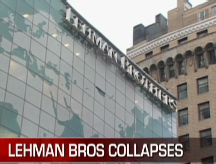Subprime crisis: A timeline
Hints of turmoil in the subprime mortgage market began to surface less than 2 years ago.
NEW YORK (CNNMoney.com) -- The subprime mortgage meltdown and resulting rippling repercussions have a brief, but dramatic, history.
Feb. 7, 2007 - HSBC announces it will see larger than anticipated losses from rising defaults of subprime mortgages in the United States, the first major bank to make an announcement about rising losses in the sector. While the announcement gets little attention at the time, subprime mortgages soon become a watch word along Wall Street and in financial news.
April 2, 2007 - New Century Financial, one of the nation's largest subprime mortgage lenders files for bankruptcy court protections, cutting 3,200 jobs, or 54% of its remaining work force that had already been scaled back in previous weeks as it stopped accepting new loans.
June 2007 - Two hedge funds run by Bear Stearns that had large holdings of subprime mortgages run into large losses and are forced to dump assets, with the trouble spreading with major Wall Street firms such as Merrill Lynch (MER, Fortune 500), JPMorgan Chase (JPM, Fortune 500), Citigroup (C, Fortune 500) and Goldman Sachs (GS, Fortune 500) which had loaned the firm money.
Sept. 18, 2007 - The Federal Reserve starts cutting interest rates, citing the credit crunch on Wall Street and in the broad economy. The nation's central bank will make cuts at seven straight meetings, including one emergency meeting, before it pauses. It also agrees to start loaning money directly to Wall Street firms, rather than only to commercial banks, and to accept troubled mortgage-backed securities as collateral.
July 11, 2008 - The FDIC takes over IndyMac, a California bank that had been one of the leading lenders who made home loans to people who did not provide proof of their income. The failure may turn out to be the most expensive in U.S. history, but FDIC warns that more bank failures lay ahead.
March 16, 2008 - JPMorgan Chase & Co. acquires troubled Wall Street firm Bear Stearns, in a deal engineered by the Federal Reserve, which agrees to provide up to $29 billion in financing to cover potential Bear Stearns losses that JPMorgan agrees to assume.
Sept. 6, 2008 - Treasury Secretary Henry Paulson announces a takeover of Fannie Mae (FNM, Fortune 500) and Freddie Mac (FRE, Fortune 500), putting the government in charge of the twin mortgage giants that own or back more than $5 trillion in mortgages. The Treasury Department agrees to provide up to $200 billion in loans to the cash-starved firms that are crucial sources of mortgage funding for banks and other home lenders.
Sept. 15, 2008 - Bank of America (BAC, Fortune 500) agrees to acquire Merrill Lynch, in a deal joining one of the nation's largest banks with one of the its largest brokerage firms, for up to $50 billion. Deal comes after talks to have Bank of America buy Lehman Brothers, another money-losing Wall Street firm, fall through. Unable to find a buyer, Lehman Brothers files for bankruptcy court protection. ![]()







